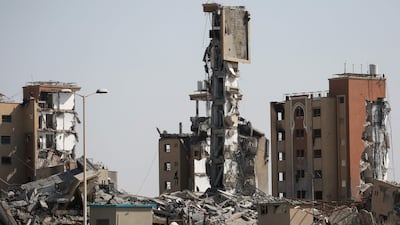Live updates: Follow the latest on Israel-Gaza
Gaza suffered about $18.5 billion in damage to critical infrastructure in the first four months of the Israeli bombardment, according to a joint report by the World Bank and the UN.
The total damage during the October-January period is equivalent to 97 per cent of the combined GDP of the occupied West Bank and Gaza in 2022, said the interim damage assessment report, released on Tuesday.
“The shock to Gaza’s economy as a result of the ongoing conflict is one of the largest observed in recent economic history,” the World Bank said.
“The magnitude of loss of life and the rapid and extensive damage to infrastructure surpass any benchmarks set by historical precedents both within the region and in recent global conflicts."
The consequences are expected to exert a “prolonged and substantial burden on economic activities for several years ahead", it added.
The damage to structures has affected every sector of the economy, with housing accounting for 72 per cent of the total cost, at $13.2 billion, and public service infrastructure such as water, health and education accounting for 19 per cent.
About 62 per cent of all homes in Gaza, equivalent to 290,820 housing units, were either damaged or destroyed in the first four months of the war, the report added.
An estimated 26 million tonnes of debris and rubble have been left in the wake of the destruction, “an amount that is estimated to take years to remove”, it said.
Commercial and industrial buildings also suffered heavy damage accounting for 9 per cent of the total cost, at $1.6 billion.
Damage to agriculture is estimated at $629 million, while the health sector suffered as much as $554 million in damage and the education sector an estimated $341 million.
Other sectors of the economy including transport, environment, information and communication and technology, energy and municipal services were also adversely affected by Israeli bombing, the report said.

The war began on October 7, when Hamas fighters attacked southern Israel, killing about 1,200 people and taking more than 200 hostages.
Israel retaliated with air strikes and a siege of the enclave, with the death toll standing at about 33,000 and 75,577 injured, according to Hamas-run Health Ministry.

The economic outlook for Gaza was grim even before the war broke out amid the Israeli blockade, with the unemployment rate in the narrow enclave reaching 45 per cent and youth unemployment at nearly 60 per cent.
The war has exacerbated the situation further. As of the end of January, the unemployment rate has surged to 74 per cent of Gaza’s workforce as a result of the destruction of physical assets, personal injuries, internal displacement and the halt of economic activity in the wake of Israeli attacks, the World Bank said.
Gaza's economy also shrunk amid Israeli attacks.
Last year, Gaza’s economy contracted by 24 per cent on an annual basis and 86 per cent in the fourth quarter compared to the same period of the previous year and to the previous quarter, the report found.
“A vast number of Palestinians in Gaza were pushed into poverty due to a multilayered shock affecting productive capacity, on account of the destruction of agricultural land, fishing ports and local fleets, the destruction or inoperability of food shops and markets, the scarcity of water, flour, fuel and electricity, as well as starving livestock that is unable to provide sustenance or serve as a food source,” the World Bank said.

The report, financed by the EU, also said consumer price inflation in Gaza increased by 33 per cent in the fourth quarter of last year compared to the previous quarter, due largely to supply disruption stemming from the war.
Food prices in Gaza increased by 39 per cent quarter-on-quarter, driven by reduced access to food, heightened transport costs and lower volumes of aid, while the complete cessation of fuel and gas supplies through the crossings resulted in a 143 per cent increase in the price of travelling on transport.
The report also highlighted the humanitarian impact, with more than half the population of Gaza estimated to be on the brink of famine and well in excess of a million without a home.
“Early recovery actions” should be established as soon as the situation allows, to help people and prevent further damage to the economy, the World Bank said.
To enable the private sector to respond to urgent needs and create jobs, "priority actions may include setting up temporary structures for enterprises providing essential goods and services setting up digital payment systems to enable electronic transactions, and restoring partially damaged facilities to enable electronic transactions", it added.


